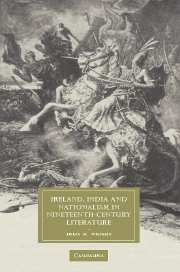Book contents
- Frontmatter
- Contents
- Acknowledgments
- Introduction: Insensible Empire
- PART I National Feeling, Colonial Mimicry, and Sympathetic Resolutions
- 1 “National feeling” and unfeeling empire: the politics of sensibility
- 2 Empowering the colonized nation; or, virtue rewarded
- 3 Travellers, converts, and demagogues
- PART II Colonial Gothic and the Circulation of Wealth
- Conclusion: The Wild Irish Boy in India
- Notes
- Bibliography
- Index
- CAMBRIDGE STUDIES IN NINETEENTH-CENTURY LITERATURE AND CULTURE
3 - Travellers, converts, and demagogues
Published online by Cambridge University Press: 31 July 2009
- Frontmatter
- Contents
- Acknowledgments
- Introduction: Insensible Empire
- PART I National Feeling, Colonial Mimicry, and Sympathetic Resolutions
- 1 “National feeling” and unfeeling empire: the politics of sensibility
- 2 Empowering the colonized nation; or, virtue rewarded
- 3 Travellers, converts, and demagogues
- PART II Colonial Gothic and the Circulation of Wealth
- Conclusion: The Wild Irish Boy in India
- Notes
- Bibliography
- Index
- CAMBRIDGE STUDIES IN NINETEENTH-CENTURY LITERATURE AND CULTURE
Summary
“So, you say Theodore is willing to become a Protestant to marry you, Fanny; but have you, my dear, considered of it well?” “I have indeed, mother,” answered Fanny. “And will you consent to marry a man that will change his religion for a mistress? If he does change, think how little devotion he can have at bottom; and where there is no religion, there is seldom virtue, and consequently no happiness.”
Regina Maria Roche, “Hold your Religion Sacred” in London TalesIn the nineteenth century, the British Empire relied extensively on religion as a disciplinary mechanism in both the literal and the Foucauldian senses. In the literal sense of discipline, religious groups outside the Anglican or Christian fold were penalized in material terms, through incarceration and fines as well as a range of other punitive measures. In Ireland before 1829, for instance, Catholics could not hold political office or become lawyers, and various laws conspired to undermine their landholdings. In the Foucauldian sense of the term, those who were within the dominant religious fold were largely assumed to have internalized, along with their faith, a range of secular beliefs, including political values consistent with British hegemony. As R. Gregory Van Dussen notes of proselytization efforts in Ireland at this time, “Religious conversion, in other words, could be expected to produce political loyalty to the colonial regime. One is implied by the other, not through any theological necessity, but through the inner logic of imperial Protestantism.”
- Type
- Chapter
- Information
- Publisher: Cambridge University PressPrint publication year: 2007



